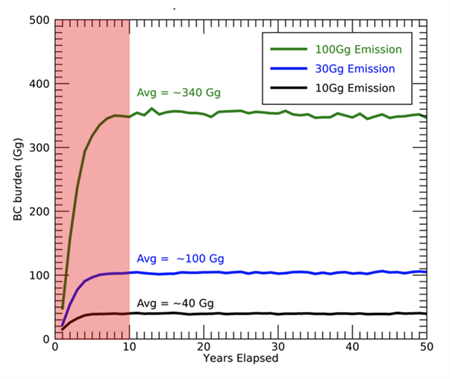Study: Rocket-fueled ‘space’ pollution has impacts on Earth
 30 Juni 2022
30 Juni 2022
Last year was a record-setting year for rocket launches, with SpaceX and similar firms promising even more as the industry evolves. But that also means ozone layer damage caused by the black carbon released into the stratosphere, according to a new study from NOAA’s Earth System Research Laboratories.
The rocket launch rates have more than tripled in recent decades, with pollution from the kerosene fuels currently putting about 1,000 tons of black carbon into the stratosphere every year. However, the number of launches to deliver communication satellites and for other purposes might realistically rise by tenfold in the next two decades.
The related rise in black carbon emissions may then lead to disruptions in public health, as well as agriculture and ecosystems, based on research model findings published this month in the Journal of Geophysical Research Atmospheres.
“Our work emphasizes the importance of ozone depletion caused by soot particles emitted by liquid-fueled rockets,” said co-author Martin Ross of Aerospace Corporation. “These simulations change the long-held belief that spaceflight’s only threat to the ozone layer was from solid-fueled rockets. We’ve shown that particles are where the action is for spaceflight’s impacts.”
What the models show so far is that an estimated 10,000 metric tons of rocket-related soot pollution, delivered over the northern hemisphere every year for 50 years, would raise temperatures in the stratosphere by up to 2°C. It also would slow the Earth’s subtropical jet streams by as much as 3.5%.
Those aren’t changes that human populations experience at the surface, but the ozone layer would be affected at and above latitudes of 30°N. That’s anywhere north of a line that roughly extends through the southern United States and across parts of North Africa, the Middle East, India and China. At 4%, the highest loss of ozone would occur at the North Pole in the month of June.
Without the ozone, people are exposed to more harmful ultraviolet light and a greater risk of skin cancer and immune system changes. Additional climate impacts arise from shifts in the wind patterns.
“We need to learn more about the potential impact of hydrocarbon-burning engines on the stratosphere and on the climate at the surface of the Earth,” said lead author Christopher Maloney, a CIRES research scientist working in NOAA’s Chemical Sciences Laboratory. “With further research, we should be able to better understand the relative impacts of different rocket types on climate and ozone.”

The post Study: Rocket-fueled ‘space’ pollution has impacts on Earth appeared first on Sustainability Times.
